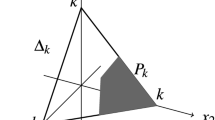Abstract
In this paper I examine single member, simple plurality elections with n ≥ 3 probabilistic voters and show that the maximization of expected vote share and maximization of probability of victory are “generically different” in a specific sense. More specifically, I first describe finite shyness (Anderson and Zame in Adv Theor Econ 1:1–62, 2000), a notion of genericity for infinite dimensional spaces. Using this notion, I show that, for any policy \(x^{*}\) in the interior of the policy space and any candidate j, the set of n-dimensional profiles of twice continuously differentiable probabilistic voting functions for which \(x^{*}\) simultaneously satisfies the first and second order conditions for maximization of j’s probability of victory and j’s expected vote share at \(x^{*}\) is finitely shy with respect to the set of n-dimensional profiles of twice continuously differentiable probabilistic voting functions for which \(x^{*}\) satisfies the first and second order conditions for maximization of j’s expected vote share.
Similar content being viewed by others
References
Aliprantis CD, Border KC (1994) Infinite dimensional analysis: A Hitchhiker’s guide. Springer, Berlin Heidelbnerg New York
Anderson R, Zame WR (2000) Genericity with infinitely many parameters. Adv Theor Econ 1:1–62
Aranson PH, Hinich MJ, Ordeshook PC (1974) Election goals and strategies: equivalent and nonequivalent candidate objectives. Am Polit Sci Rev 68:135–152
Coughlin PJ (1992) Probabilistic voting theory. Cambridge University Press, Cambridge
Duggan J (2000) Equilibrium equivalence under expected plurality and probability of winning maximization. Mimeo, University of Rochester
Halmos PR (1974) Measure theory. Springer, Berlin Heidelberg New York
Hinich M (1977) Equilibrium in spatial voting: the median voter result is an artifact. J Econ Theory 16:208–219
Hunt BR, Sauer T, Yorke JA (1992) Prevalence: a translation-invariant ‘Almost Every’ on infinite-dimensional spaces. Bull (New Series) Am Math Soc 27:217–238
Ledyard J (1984) The pure theory of large two-candidate elections. Public Choice 44:7–41
Mas-Colell A (1985) The theory of general economic equilibrium: A differentiable approach. Cambridge University Press, Cambridge
Patty JW (2001) Plurality and probability of victory: some equivalence results. Public Choice 112:151–166
Patty JW (2000) Voting games with incomplete information. Unpublished Ph.D, Dissertation, California Institute of Technology
Author information
Authors and Affiliations
Corresponding author
Rights and permissions
About this article
Cite this article
Patty, J.W. Generic difference of expected vote share and probability of victory maximization in simple plurality elections with probabilistic voters. Soc Choice Welfare 29, 149–173 (2007). https://doi.org/10.1007/s00355-006-0200-5
Received:
Accepted:
Published:
Issue Date:
DOI: https://doi.org/10.1007/s00355-006-0200-5




